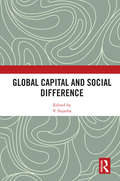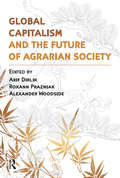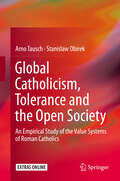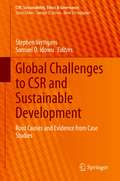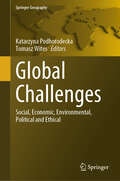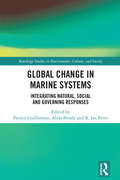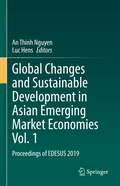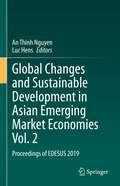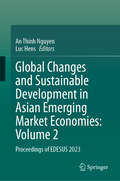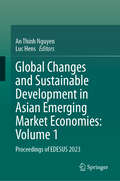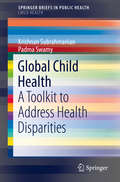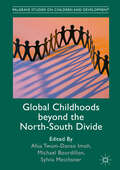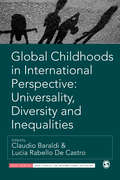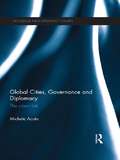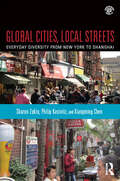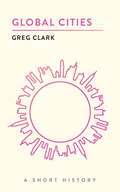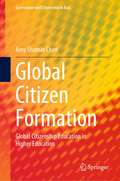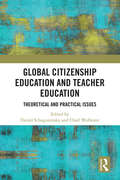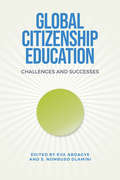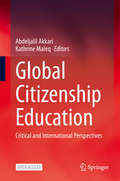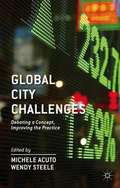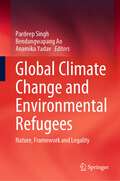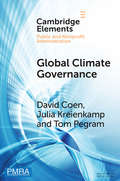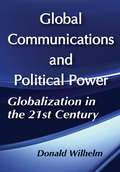- Table View
- List View
Global Capital and Social Difference
by V. SujathaThis volume offers insights into ongoing, global socio-economic transformations by directing attention to the significance of labour, work, craft, community, social institutions, social movements and, emergent subjectivities in different parts of the world. This is in contrast to theories that project globalisation as a process driven exclusively by global capital and technology, a scheme in which some parts of the world forever will be ‘peripheries’ supplying labor and natural resources, the lives and work of those people purged of originality, meaning and value by the very construct that describes them. Together the chapters in the book present a non-essentialist and non-linear reading of global transformations by examining the relations and adaptations between economy, polity and society, which remains a fundamentally unresolved question in the social sciences. Combining a wealth of conceptual and empirical investigations, this book will be of interest to scholars and researchers of sociology, globalisation studies, anthropology, economics, development studies, and Area studies.
Global Capitalism and the Future of Agrarian Society
by Arif Dirlik Alexander Woodside Roxann PrazniakThis book offers historical and comparative analyses of changes in agrarian society forced by the globalization of capitalism, and the implications of these changes for human welfare globally. The book gives special attention to recent economic development and urbanization in the People s Republic of China which have had a major impact on contemporary transformations globally. Case studies from South and Southeast Asia, Africa and Latin America in turn place these transformations in a comparative global perspective. The contributors include distinguished scholars from the UN, PRC, India, Zimbabwe, and Latin America who are also active in policy issues."
Global Catholicism, Tolerance and the Open Society: An Empirical Study of the Value Systems of Roman Catholics
by Arno Tausch Stanislaw ObirekThis book systematically assesses the political and social values of the more than 1.3 billion Catholics around the globe, by far the largest denomination of Western Christianity. Based on an extensive analysis of data from the World Values Survey and other global opinion surveys, the book sheds new light on the value systems and opinions of Roman Catholics. The authors highlight core problems and challenges the Church is currently facing in adapting to the modern world, including Catholic anti-Semitism, religious and sexual tolerance, and opinions towards democracy, while also offering an anthropological reflection on how well the Church is adapting or failing to adapt to the requirements of an open society.
Global Challenges to CSR and Sustainable Development: Root Causes and Evidence from Case Studies (CSR, Sustainability, Ethics & Governance)
by Samuel O. Idowu Stephen VertigansThis book examines and analyzes the challenges programmes for Corporate Social Responsibility (CSR) and sustainable development are facing in global management practice. It looks at the dichotomy of a general and popular demand for responsible and resilient management, and the counterplayers that impact the positive effect of such efforts. The book assembles latest research looking at the root causes for this opposition, and new case studies that showcase the dilemma and possible solutions to overcome it. Overall, the book juxtaposes short terminism within CSR programmes and longer term sustainable development, mis-allocation of resources and failed promises associated with CSR, and sketches pathways how CSR and sustainable development can be directed towards the most pressing issues.
Global Challenges: Social, Economic, Environmental, Political and Ethical (Springer Geography)
by Katarzyna Podhorodecka Tomasz WitesThis book addresses some of the most urgent global problems in today's world from a geographical perspective and highlights contemporary environmental, political, economic, social and geoethical aspects. The authors discuss causes, developments and challenges faced on a regional and global scale covering among others environmental issues such as loss of biodiversity, development of tourism, natural hazards and disaster risk reduction, migration issues, the global economic crisis and sustainable development. The presented collection of concepts and examples from specific regions offer a new outlook on globalization issues in the world as a whole. This volume can be used as a guide for students from different faculties who wish to understand global issues in the world from a geographical perspective. This book appeals to scientists and students of geography, economics, geopolitics, sustainability issues as well as policy makers and planners.
Global Change in Marine Systems: Societal and Governing Responses (Routledge Studies in Environment, Culture, and Society)
by Patrice Guillotreau Alida Bundy R. Ian PerryMarine social and ecological systems around the world face multiple natural and anthropogenic stressors associated with global change. The resulting changes can create hardship for local societies that depend on them for food, livelihoods and wellbeing. Knowing how to respond to global change in a timely and appropriate manner is increasingly occupying the attention of researchers, policy makers, decision makers and practitioners around the world. Written by an international group of researchers from the natural and social sciences, Societal and governing responses to Global Change in Marine Systems analyses and appraises societal and governing responses to change, highlighting and explaining similarities and distinctions between successful, and less successful, responses. The authors present "I-ADApT", an analytical framework that enables decision makers to consider possible responses to global change, based on experiences elsewhere. Within this volume, I-ADApT is applied to 20 enlightening case studies covering a wide range of marine systems that have been challenged by critical global change issues around the world. Introducing innovative research to work towards a range of possible responses to global change, Societal and governing responses to Global Change in Marine Systems will appeal to undergraduate and postgraduate students, as well as postdoctoral researchers and practitioners interested in fields such as: Environment & Natural Resources, Marine Resources and social sciences.
Global Changes and Sustainable Development in Asian Emerging Market Economies Vol. 1: Proceedings of EDESUS 2019
by An Thinh Nguyen Luc HensThis two-volume set presents the conference papers from the 1st International Conference on Economics, Development and Sustainability (EDESUS 2019), organized by the University of Economics and Business, Vietnam National University, Hanoi. The collection addresses global changes and sustainable development in Vietnam and other emerging market economies in Asia, and covers wider topics such as economics and business (e.g. economic theory, national and international income distribution, macroeconomic policies, sectors of economy, productivity developments, financial market, business governance, bank financing), development and sustainability (e.g. developing process, development policy, public policy, sustainable growth, sustainability tools, sustainable livelihood, sustainable tourism, green growth), and resources and global change (e.g. human resources, natural resources, climate change, globalization, global challenges). The books are of interest to professors, researchers, lecturers, and students in economics and geography, consultants, and decision makers interested in global changes and sustainable development. Volume 1 focuses on economic development in Vietnam and other emerging market economies in Asia. This covers topics such as economics and business (e.g. economic theory, national and international income distribution, macroeconomic policies, sectors of economy, productivity developments, financial market, business governance, bank financing) and development studies (e.g. developing process, development policy, public policy, green growth).
Global Changes and Sustainable Development in Asian Emerging Market Economies Vol. 2: Proceedings of EDESUS 2019
by An Thinh Nguyen Luc HensThis two-volume set presents the conference papers from the 1st International Conference on Economics, Development and Sustainability (EDESUS 2019), organized by the University of Economics and Business, Vietnam National University, Hanoi. The collection addresses global changes and sustainable development in Vietnam and other emerging market economies in Asia, and covers wider topics such as economics and business (e.g. economic theory, national and international income distribution, macroeconomic policies, sectors of economy, productivity developments, financial market, business governance, bank financing), development and sustainability (e.g. developing process, development policy, public policy, sustainable growth, sustainability tools, sustainable livelihood, sustainable tourism, green growth), and resources and global change (e.g. human resources, natural resources, climate change, globalization, global challenges). The books are of interest to professors, researchers, lecturers, and students in economics and geography, consultants, and decision makers interested in global changes and sustainable development. Volume 2 focuses on global changes and sustainable development in Vietnam and other emerging market economies in Asia. This covers topics such as sustainability (e.g. sustainable growth, sustainability tools, sustainable livelihood, sustainable tourism), and change in resources globally (e.g. human resources, natural resources, climate change, globalization, global challenges).
Global Changes and Sustainable Development in Asian Emerging Market Economies: Proceedings of EDESUS 2023
by An Thinh Nguyen Luc HensThis two-volume set presents the conference papers from the 2023 iteration of the International Conference on Economics, Development and Sustainability (EDESUS 2023), organized by the VNU University of Economics and Business, Vietnam National University, Hanoi. The collection addresses global changes and sustainable development in Vietnam and other emerging market economies in Asia, and covers wider topics such as economics and business (e.g. economic theory, national and international income distribution, macroeconomic policies, sectors of economy, productivity developments, financial market, business governance, bank financing), development and sustainability (e.g. developing process, development policy, public policy, sustainable growth, sustainability tools, sustainable livelihood, sustainable tourism, green growth), and resources and global change (e.g. human resources, natural resources, climate change, globalization, global challenges). The books are of interest to professors, researchers, lecturers, and students in economics and geography, consultants, and decision makers interested in global changes and sustainable development. Volume 2 focuses on global changes and sustainable development in Vietnam and other emerging market economies in Asia. This covers topics such as sustainability (e.g. sustainable growth, sustainability tools, sustainable livelihood, sustainable tourism), and change in resources globally (e.g. human resources, natural resources, climate change, globalization, global challenges).
Global Changes and Sustainable Development in Asian Emerging Market Economies: Proceedings of EDESUS 2023
by An Thinh Nguyen Luc HensThis two-volume set presents the conference papers from the 2023 iteration of the International Conference on Economics, Development and Sustainability (EDESUS 2023), organized by the VNU University of Economics and Business, Vietnam National University, Hanoi. The collection addresses global changes and sustainable development in Vietnam and other emerging market economies in Asia, and covers wider topics such as economics and business (e.g. economic theory, national and international income distribution, macroeconomic policies, sectors of economy, productivity developments, financial market, business governance, bank financing), development and sustainability (e.g. developing process, development policy, public policy, sustainable growth, sustainability tools, sustainable livelihood, sustainable tourism, green growth), and resources and global change (e.g. human resources, natural resources, climate change, globalization, global challenges). The books are of interest to professors, researchers, lecturers, and students in economics and geography, consultants, and decision makers interested in global changes and sustainable development. Volume 1 focuses on economic development in Vietnam and other emerging market economies in Asia. This covers topics such as economics and business (e.g. economic theory, national and international income distribution, macroeconomic policies, sectors of economy, productivity developments, financial market, business governance, bank financing) and development studies (e.g. developing process, development policy, public policy, green growth).
Global Child Health: A Toolkit To Address Health Disparities (Springerbriefs In Public Health)
by Krishnan Subrahmanian Padma SwamyThis timely resource brings child health to the forefront of global health and the crucial goal of universal equity of care. Its resource-based framework offers contemporary perspective on factors driving child health disparities, specific vulnerabilities of underserved children, and ways readers can become effective advocates for children. The book critiques current child health policy worldwide, examining both policies that are helping to alleviate and are contributing to further inequities. And the authors provide an extensive toolkit to aid professionals in multidimensional screening for child, newborn, maternal, and post-natal health as well as socioeconomic determinants of health. Included in the coverage:· What is global health? · The current state of global child health and disparities · Global health disparities in high-resource settings · Pathologies disproportionally affecting the underserved · Policy and advocacy framework · Navigating the domestic resources (an advocate’s well child check) Global Child Health will find a ready audience among child health providers (physicians, advanced practice providers, nursing staff, social workers, allied healthcare providers, public health professionals), medical educators (medical schools, departments of pediatrics, schools of public health, nursing schools and programs, schools of allied health), and child health policymakers (staff at USAID, Health and Human Services, health services researchers in child and global health policy, health advocacy-related nonprofit organizations).
Global Childhoods beyond the North-South Divide (Palgrave Studies On Children And Development Ser.)
by Michael Bourdillon Afua Twum-Danso Imoh Sylvia MeichsnerThis book explores children’s lives across the Global North and Global South in the context of academic discussions of childhoods. The edited volume offers a unique selection of materials suitable for teaching in the areas of children, childhoods, young people, families, and education in a global context, as well as specific aspects of international development and social policy. While the focus of the project is conceptual rather than practical, the holistic understanding of childhoods that it encourages should also enable practitioners to better ensure that they are improving the lives of the children.
Global Childhoods in International Perspective: Universality, Diversity and Inequalities (SAGE Studies in International Sociology)
by Claudio Baraldi Lucia Rabello De CastroGlobal Childhoods in International Perspective gathers a wide spectrum of contributors from Europe, the U.S., South Asia, South Africa and Latin America, who, attuned with present dilemmas in the area of childhood studies, discuss some key theoretical and empirical aspects of child scholarship, such as identity, child wellbeing, child mobility and migration, intergenerational relationships and child abuse. Through these expert contributions, the book explores the many ways in which the relationship between universality and particularities of childhood plays an important role in describing global childhoods. The book highlights childhood as a cross-cutting issue in global sociology with chapters on globalization and schooling in Burkina Faso, child abuse and neglect in India, identity and integration among children of African immigrants in France, social class mobility of Filipino migrant children in Italy and France, and an investigation into Kyrgyz childhoods. Ideal reading for researchers, practitioners and students interested in both childhood studies and the other areas including community research, sociology of education, social stratification, and the sociology of migration.
Global Childhoods in International Perspective: Universality, Diversity and Inequalities (SAGE Studies in International Sociology)
by Claudio Baraldi Lucia Rabello De CastroGlobal Childhoods in International Perspective gathers a wide spectrum of contributors from Europe, the U.S., South Asia, South Africa and Latin America, who, attuned with present dilemmas in the area of childhood studies, discuss some key theoretical and empirical aspects of child scholarship, such as identity, child wellbeing, child mobility and migration, intergenerational relationships and child abuse. Through these expert contributions, the book explores the many ways in which the relationship between universality and particularities of childhood plays an important role in describing global childhoods. The book highlights childhood as a cross-cutting issue in global sociology with chapters on globalization and schooling in Burkina Faso, child abuse and neglect in India, identity and integration among children of African immigrants in France, social class mobility of Filipino migrant children in Italy and France, and an investigation into Kyrgyz childhoods. Ideal reading for researchers, practitioners and students interested in both childhood studies and the other areas including community research, sociology of education, social stratification, and the sociology of migration.
Global Cities, Governance and Diplomacy: The Urban Link (Routledge New Diplomacy Studies)
by Michele AcutoThis book illustrates the importance of global cities for world politics and highlights the diplomatic connections between cities and global governance. While there is a growing body of literature concerned with explaining the transformations of the international order, little theorisation has taken into account the key metropolises of our time as elements of these revolutions. The volume seeks to fill this gap by demonstrating how global cities have a pervasive agency in contemporary global governance. The book argues that looking at global cities can bring about three fundamental advantages on traditional IR paradigms. First, it facilitates an eclectic turn towards more nuanced analyses of world politics. Second, it widens the horizon of the discipline through a multiscalar image of global governance. Third, it underscores how global cities have a strategic diplomatic positioning when it comes to core contemporary challenges such as climate change. This book will be of much interest to students of urban studies, global governance, diplomacy and international relations in general.
Global Cities, Local Streets: Everyday Diversity from New York to Shanghai
by Philip Kasinitz Sharon Zukin Xiangming ChenGlobal Cities, Local Streets: Everyday Diversity from New York to Shanghai, a cutting-edge text/ethnography, reports on the rapidly expanding field of global, urban studies through a unique pairing of six teams of urban researchers from around the world. The authors present shopping streets from each city – New York, Shanghai, Amsterdam, Berlin, Toronto, and Tokyo – how they have changed over the years, and how they illustrate globalization embedded in local communities. This is an ideal addition to courses in urbanization, consumption, and globalization.. The book’s companion website, www.globalcitieslocalstreets.org, has additional videos, images, and maps, alongside a forum where students and instructors can post their own shopping street experiences.
Global Cities: A Short History
by Greg ClarkWhy have some cities become great global urban centers, and what cities will be future leaders? <p><p> From Athens and Rome in ancient times to New York and Singapore today, a handful of cities have stood out as centers of global economic, military, or political power. In the twenty-first century, the number of truly global cities is greater than ever before, reflecting the globalization of both economic and political power.In Global Cities: A Short History, Greg Clark, an internationally renowned British urbanist, examines the enduring forces-such as trade, migration, war, and technology-that have enabled some cities to emerge from the pack into global leadership. Much more than a historical review, Clark’s book looks to the future, examining the trends that are transforming cities around the world as well as the new challenges all global cities, increasingly, will face. <p> Which cities will be the global leaders of tomorrow? What are the common issues and opportunities they will face? What kinds of leadership can make these cities competitive and resilient? Clark offers answers to these and similar questions in a book that will be of interest to anyone who lives in or is affected by the world’s great urban areas.
Global Citizen Formation: Global Citizenship Education in Higher Education (Governance and Citizenship in Asia)
by Amy Shumin ChenThis book explains the rationale of the changes and challenges of Taiwanese citizenship which emphasizes the various identities in the global and multicultural era. It explores the evolving relationship between the social movements, citizenship, the education of citizens and the young peoples’ viewpoints, asking how citizenship has been conceptualised in a dramatic transformation age. How has the curriculum and pedagogy designed to fit the global changes for cultivating young generations with rights and responsibilities to interpret in and adapt for the competence of citizenship? And what outcomes and attainments had the Taiwan’s undergraduates’ knowledge, attitudes and practices of competency on citizenship?
Global Citizenship Education in Teacher Education: Theoretical and Practical Issues (Critical Global Citizenship Education)
by Daniel Schugurensky Charl WolhuterGlobal Citizenship Education and Teacher Education brings together scholars and practitioners from all continents to explore the role of teacher education in formulating a practice of citizenship that has a global scope and is guided by critical and emancipatory approaches. By considering educational responses to global challenges —such as global warming, rising levels of inequalities, intensification of armed conflicts, growing streams of international migration, and the impact of neoliberal policies—this book provides valuable analyses for researchers, teacher educators, and educators. The volume examines historical and conceptual issues relating to the incorporation of global citizenship education in teacher education, and presents examples from across the world that showcase main trends in research and practice from across the world. This book is of great interest to graduate and postgraduate students, researchers, and libraries in the fields of citizenship education, global education, teacher education, international and comparative education, and education policy and politics.
Global Citizenship Education: Challenges and Successes
by Aboagye And DlaminiThe idea of citizenship and conceptions of what it means to be a good citizen has evolved over time. On the one hand, good citizenship entails the ability to live with others in diverse societies, and to promote a common set of values of acceptance, human rights, and democracy. On the other hand, in order to compete in the global economy, nations require a more innovative, autonomous, inventive, and reflective workforce, meaning good citizens are also those who successfully participate in the economic development of themselves and their country. At the same time, supporting citizens to realize their responsibilities beyond the nation has become important in this rapidly changing and interconnected world. These competing citizenship purposes often compel people to either ignore or act ambivalent to democratic and human rights values. That is, profit-driven labor exploitation, for instance, contradicts human rights and democratic tenants. Thus, global citizenship education is fundamental to teaching, learning and redressing sociopolitical, economic and environmental exploitation, globally. Detailing its historical development to be recognized as a field of study, Global Citizenship Education provides a critical discourse on global citizenship education (GCE). Authors in this collection offer underpinnings of global citizenship education by discussing its contemporary theories and methodologies, and specific case studies that illustrate the application of GCE initiatives. Aboagye and Dlamini aim to motivate learners and educators in post-secondary institutions not only to understand the issues of social and economic inequality, political and civil unrest facing us, but also to take action that will lead to equitable change in local and global spaces.
Global Citizenship Education: Critical and International Perspectives
by Abdeljalil Akkari Kathrine MaleqThis open access book takes a critical and international perspective to the mainstreaming of the Global Citizenship Concept and analyses the key issues regarding global citizenship education across the world. In that respect, it addresses a pressing need to provide further conceptual input and to open global citizenship agendas to diversity and indigeneity. Social and political changes brought by globalisation, migration and technological advances of the 21st century have generated a rise in the popularity of the utopian and philosophical idea of global citizenship. In response to the challenges of today’s globalised and interconnected world, such as inequality, human rights violations and poverty, global citizenship education has been invoked as a means of preparing youth for an inclusive and sustainable world. In recent years, the development of global citizenship education and the building of students’ global citizenship competencies have become a focal point in global agendas for education, international educational assessments and international organisations. However, the concept of global citizenship education still remains highly contested and subject to multiple interpretations, and its operationalisation in national educational policies proves to be challenging. This volume aims to contribute to the debate, question the relevancy of global citizenship education’s policy objectives and to enhance understanding of local perspectives, ideologies, conceptions and issues related to citizenship education on a local, national and global level. To this end, the book provides a comprehensive and geographically based overview of the challenges citizenship education faces in a rapidly changing global world through the lens of diversity and inclusiveness.
Global City Challenges
by Michele Acuto Wendy SteeleThe contributors illustrate what twin analytical and practical challenges emerge from juxtaposing cultural, economic, historical, postcolonial, virtual, architectural, literary, security and political stances to the concept of the 'global city'.
Global Climate Change and Environmental Refugees: Nature, Framework and Legality
by Pardeep Singh Anamika Yadav Bendangwapang AoThis book explores the possibilities of understanding the concept of climate refugees in order to ascribe to a consensual agreement that climate refugees are evident and this situation is a reality.A framework to study both empirically and theoretically is presented in a detailed manner so that it may become a resource for understanding the challenges of climate refugees.Through discussion and analysis the book presents potential answers to such questions as:● Why has the international system been so short-sighted and has not given importance to the problems of climate migrants and refugees?● How to identify a climate refugee?● How do you justify a climate refugee or a migrant?● What are internally displaced people? Should we call them just refugees?The book covers the interdisciplinary nature of climate refugees and the perspectives of social science. The empirical findings provides an edge to holistically understanding climate refugees.This book discusses the concept of, what really is a climate refugee, and the necessary factors to make it an important part of the climate discourse. The legality of the term is missing in international parlance, and the academic discourse should provide the necessary critique required for the evolution of the subject under study. Therefore, the major objective of the book is to make the subject of climate migration known to all.
Global Climate Governance (Elements in Public and Nonprofit Administration)
by David Coen Julia Kreienkamp Tom PegramClimate change is one of the most daunting global policy challenges facing the international community in the 21st century. This Element takes stock of the current state of the global climate change regime, illuminating scope for policymaking and mobilizing collective action through networked governance at all scales, from the sub-national to the highest global level of political assembly. It provides an unusually comprehensive snapshot of policymaking within the regime created by the United Nations Framework Convention on Climate Change (UNFCCC), bolstered by the 2015 Paris Agreement, as well as novel insight into how other formal and informal intergovernmental organizations relate to this regime, including a sophisticated EU policymaking and delivery apparatus, already dedicated to tackling climate change at the regional level. It further locates a highly diverse and numerous non-state actor constituency, from market actors to NGOs to city governors, all of whom have a crucial role to play.
Global Communications and Political Power
by Donald WilhelmFirst published in 1990. Routledge is an imprint of Taylor & Francis.
